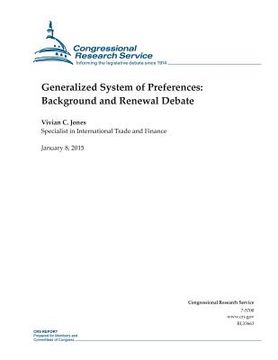Reseña del libro "Generalized System of Preferences: Background and Renewal Debate (en Inglés)"
The U.S. Generalized System of Preferences (GSP) program provides non-reciprocal, duty-free tariff treatment to certain products imported from designated beneficiary developing countries (BDCs). The United States, the European Union, and other developed countries have implemented similar programs since the 1970s. The U.S. program was first authorized in Title V of the Trade Act of 1974, and is subject to periodic renewal by Congress. The GSP program was most recently extended until July 31, 2013, in Section 1 of P.L. 112-40, and has not been renewed. Imports under the GSP program in 2012 (last full year of GSP implementation) amounted to about $19.9 billion-about 6% of all imports from GSP countries, and about 1% of total U.S. imports. The expiration of GSP means that renewal of the program may continue to be a legislative issue in the 114th Congress. In recent years, GSP renewal has been somewhat controversial. In the 113th Congress, controversy arose over the funding provisions in Senate bill S. 1331 seeking to renew GSP. Other GSP legislation introduced in the 113th Congress included H.R. 2709, H.R. 2139, and H.R. 1682. The GSP program is one of several U.S. trade preference programs through which the United States seeks to help developing countries expand their economies. Other U.S. trade preference programs are regionally focused, and include the African Growth and Opportunity Act (AGOA), the Andean Trade Preference Act (ATPA, also expired in 2013), and the Caribbean Basin Initiative (CBI). The GSP program provides duty-free entry for over 3,500 products (based on 8-digit U.S. Harmonized Tariff Schedule tariff lines) from 122 BDCs, and duty-free status to an additional 1,500 products from 43 GSP beneficiaries that are additionally designated as least-developed beneficiary developing countries (LDBDCs). U.S. implementation of GSP requires that developing countries meet certain criteria to be eligible for the program. For example, countries must not have seized ownership or control of the assets of U.S. citizens or have harmed U.S. investors in other specified ways. Eligible countries must also be taking steps to maintain internationally recognized worker rights among other things. GSP rules of origin require that at least 35% of the appraised value of the product be the "growth, product, or manufacture" of the BDC. Third, the GSP program includes certain curbs on product eligibility intended to shield U.S. manufacturers and workers from potential adverse impact due to the duty-free treatment. These include specific exclusion of certain "import sensitive" products (e.g., textiles and apparel), and limits on the quantity or value of any one product imported from any one country under the program (products from least-developed beneficiaries are not subject to this restriction). Fourth, GSP country and product eligibility are subject to annual review. This report presents, first, recent developments and a brief history, economic rationale, and legal background leading to the establishment of the GSP. Second, the report presents a discussion of U.S. implementation of the GSP. Third, the report presents an analysis of the U.S. program's effectiveness and the positions of various stakeholders. Fourth, implications of the expiration of the U.S. program and possible options for Congress are discussed.

